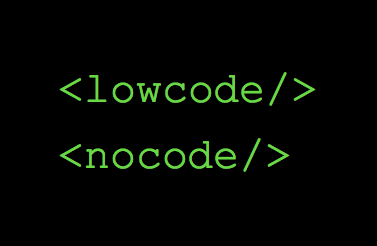
Digital transformation means that organizations need to become software-driven. The Low/No-Code (L/NC) approach to software development, a point-and-click, drag-and-drop or configuration-based approach to creating applications, aims to disrupt how this transformation takes place.
In this essay, I cover two perspectives on Low/No-Code: the organization and the developer’s perspective.
From the organization’s perspective, L/NC is about using fewer or no developer resources or needing less development expertise, lowering software development and maintenance costs. L/NC is fine for organizations that can’t have or don’t care about having software developers, and/or for the development of applications that are template-based or basic apps; good examples are legacy or back-office IT apps that consists of common UI components and behavior. Organizations need to understand that L/NC platforms are not standard, meaning that once you commit to one, you’re dependent on (locked to) that vendor, and you must maintain or find people familiar with that vendor tool and version to keep things going — the result can be a growth in unsupported apps. Organizations also will be dependent on the L/NC vendor to address security-related issues with their code generation platform. For rich apps, such as consumer-facing applications, while L/NC typically provides let’s say the 80% of the feature-set that you’ll need, it’s that other 20% that you can’t do with L/NC what sets apps apart. Some L/NC platforms allow you to extend their offering via coding, but, that means having a developer in the first place, and in my opinion would defeat their purpose. Last, auto-generated code is just not pretty or elegant; perhaps this generalization is not fair across all L/NC platforms. That being said, if you’re a small business with no development or IT team, or are not a software-driven organization, perhaps L/NC is what you need.
From the developer’s perspective, L/NC is boring. From the development manager perspective, L/NC creates a boring place for top developers to work. As a consequence, L/NC platforms make it hard to attract the best minds in software development and engineering. No way to attract the best abstract critical thinking in software. Just drag/drop, point and click “coders” or collaborators who may not understand the underlying mechanics of end-to-end software and what it means to deliver mission-critical software. For those software development managers who need to build a team, L/NC doesn’t allow to grow a top development team, doesn’t allow to grow related critical skill-sets, doesn’t allow to share true development knowledge and skill-sets across projects. If you have a great software development engineer and you force s/he to use L/NC, that engineering will quit on you; Low/No-Code is not challenging enough.
Keep in mind that the top L/NC platforms are not cheap either. Yes, L/NC allows for the targeting of multiple platforms simultaneously using low or next to zero coding skill-sets (that is, drag/drop, point and click), but regardless of outsourcing or not your software development, you need to take into consideration the above perspectives as you decide how to move forward with such an important decision for your organization and software product’s future.
We’re in the era of “Software is eating the world” and “Data is the new Oil“, an era in which to remain competitive, you must embrace this new digital transformation. For organizations with deep digital and software plans and needs, that are committed to creating great software products, this means creating software using the right approaches, the right tools, and the right team. For software organizations, this means attracting and retaining the best developers, with challenging problems, environment, and tools.
-ceo